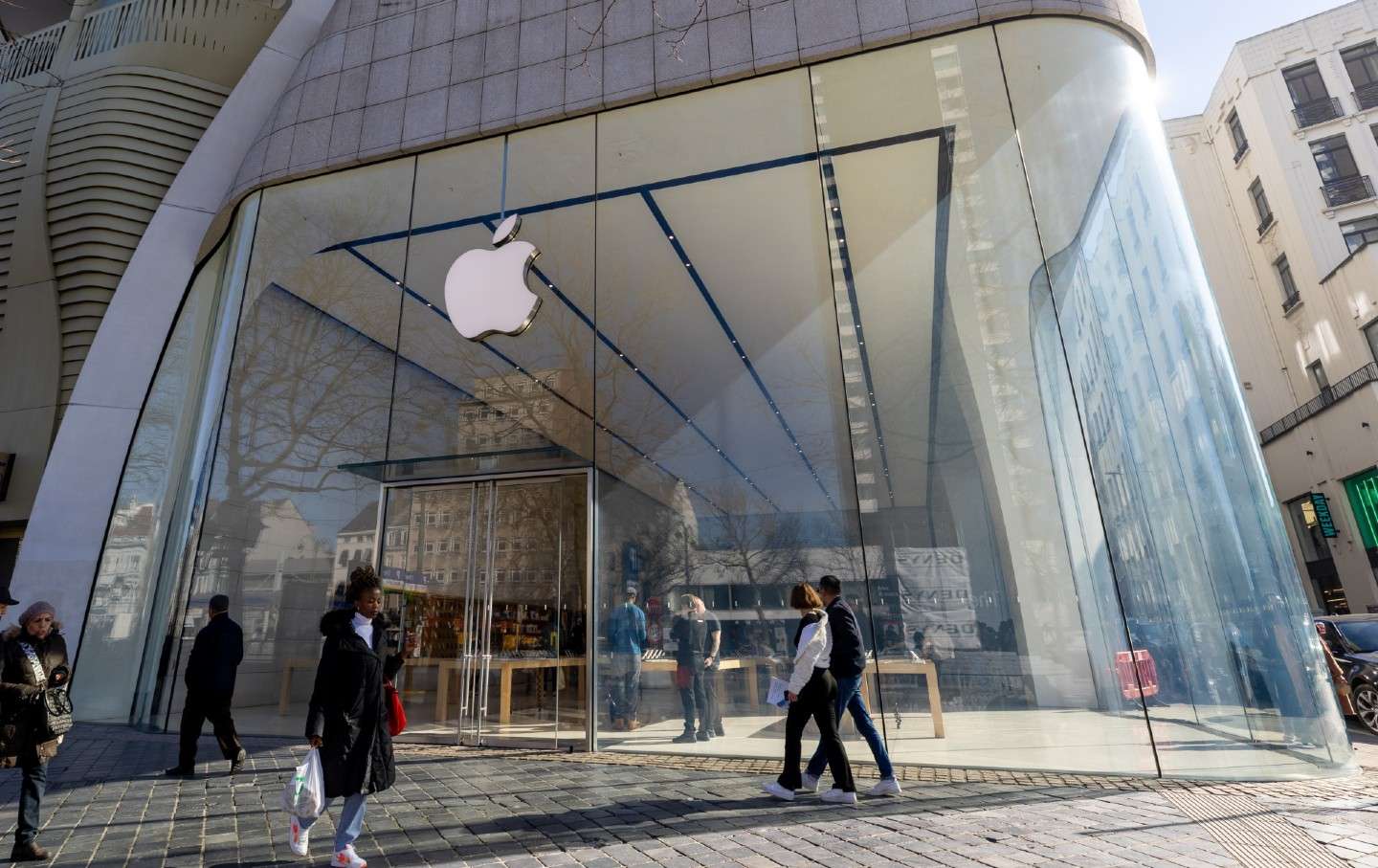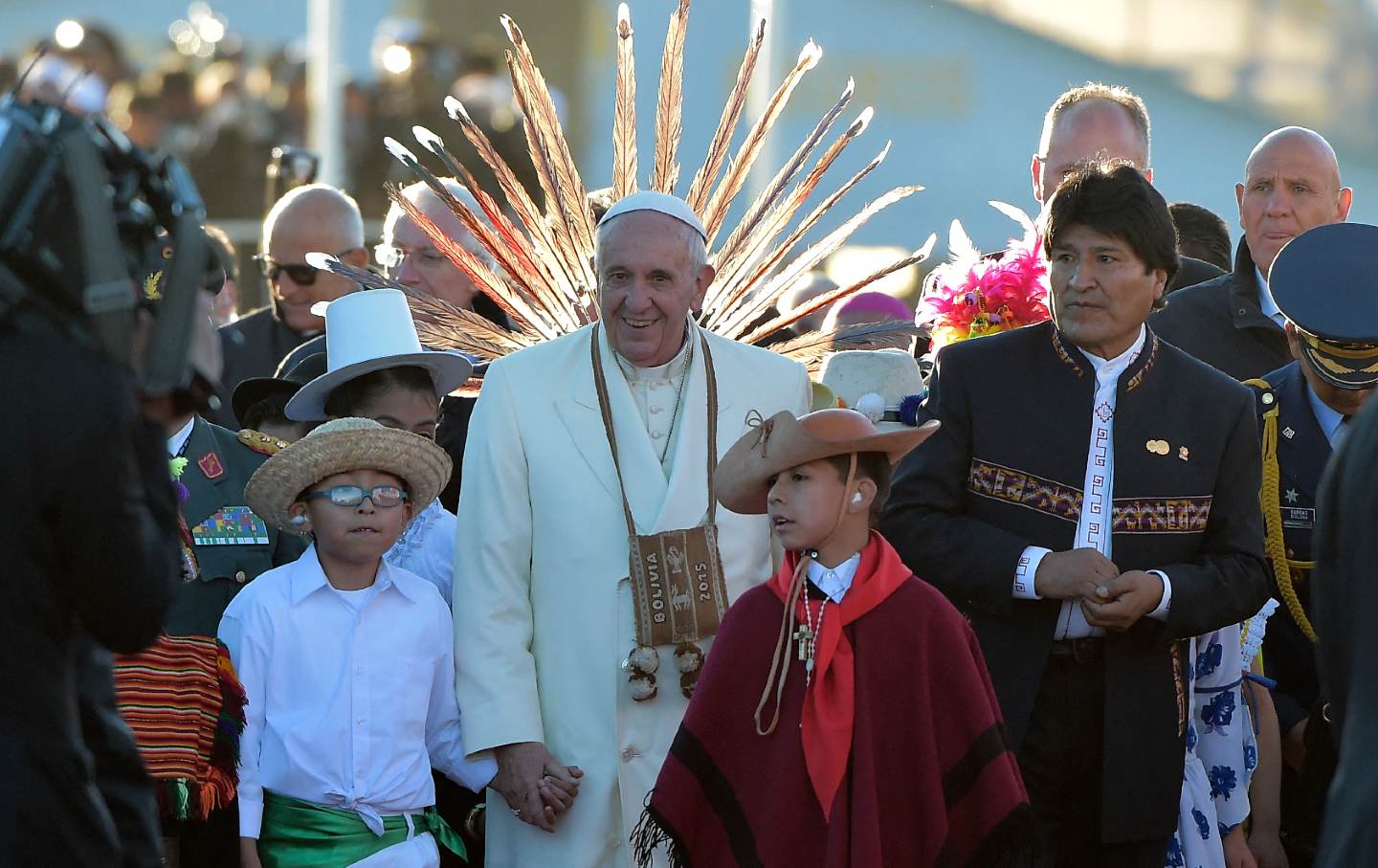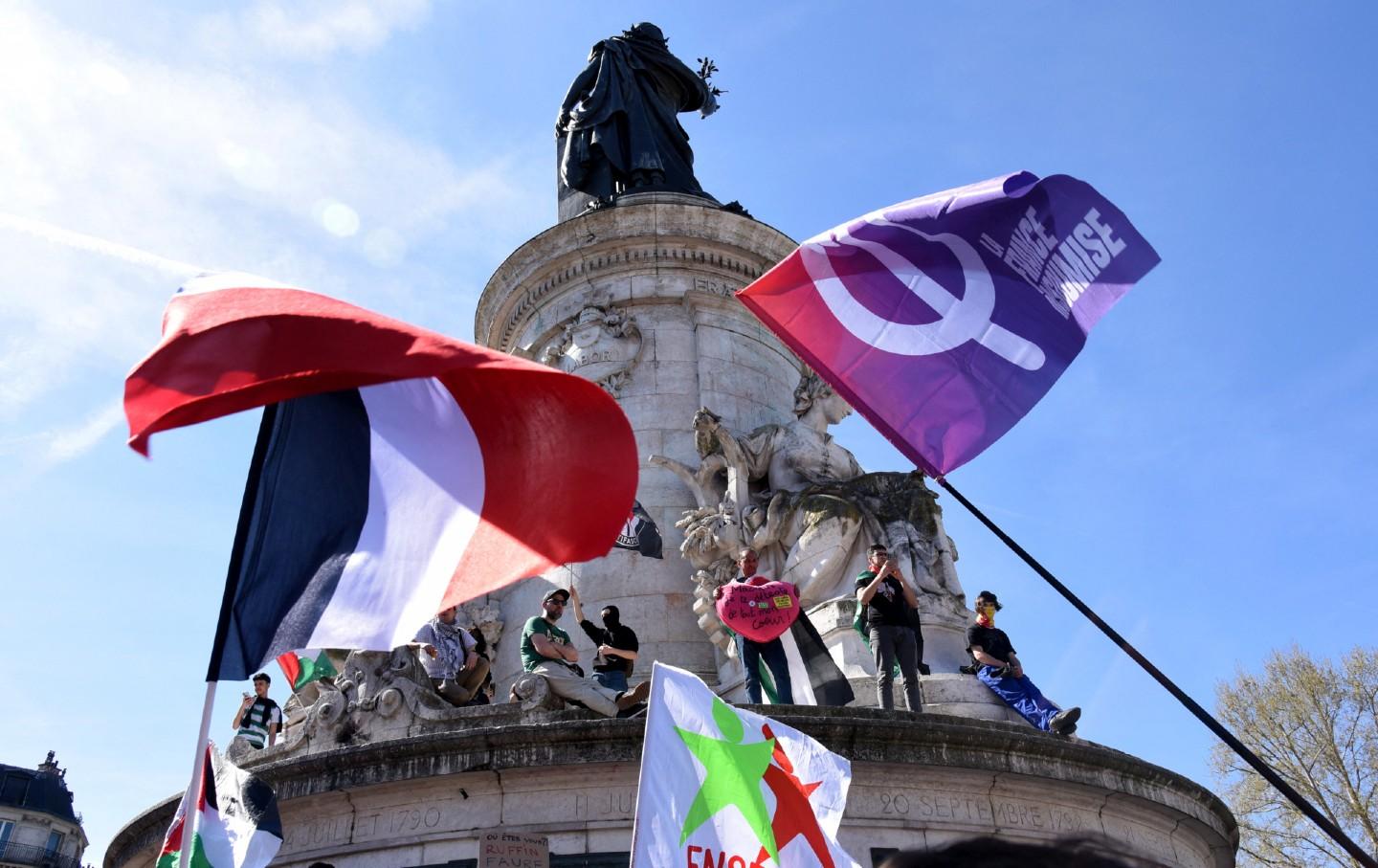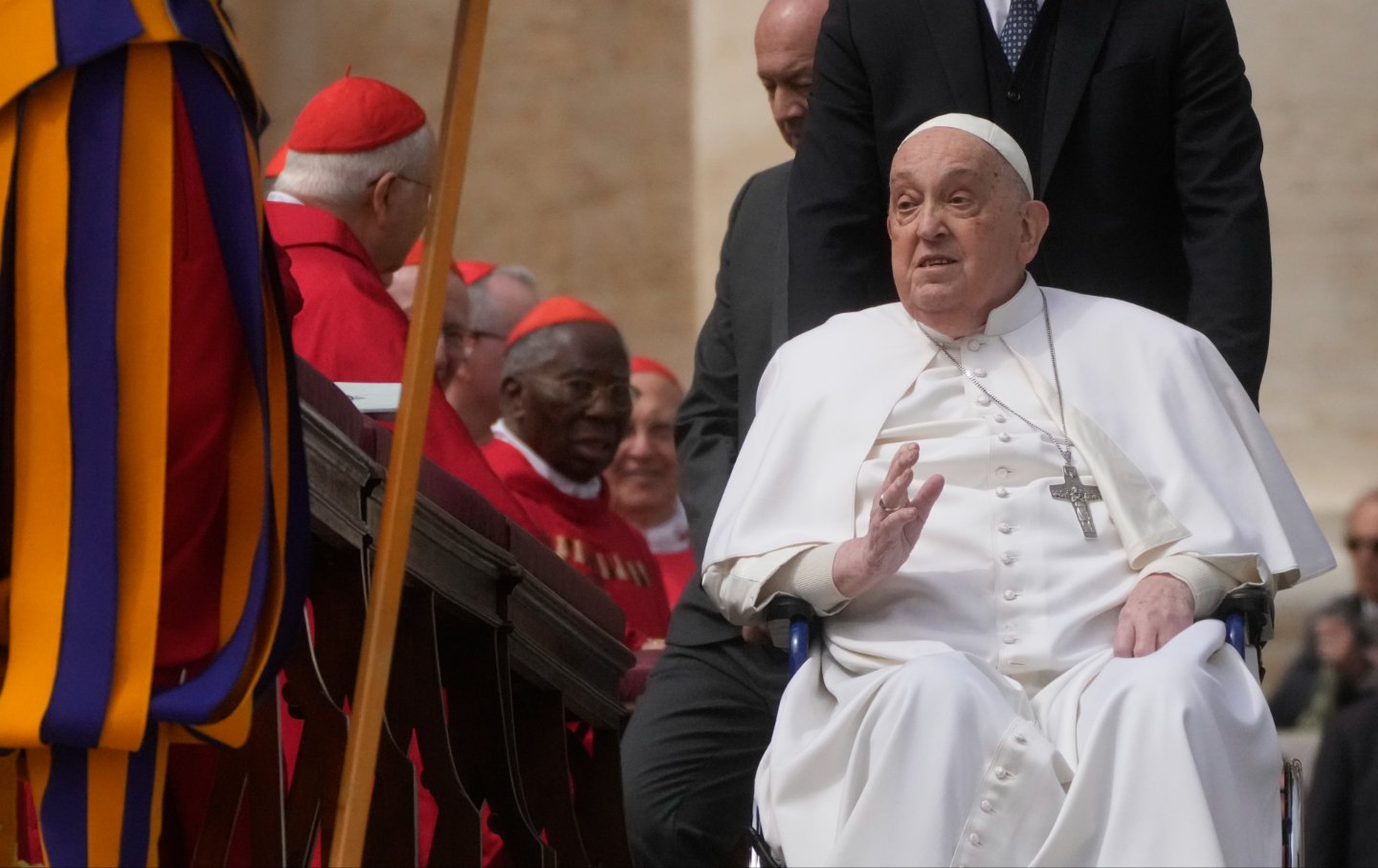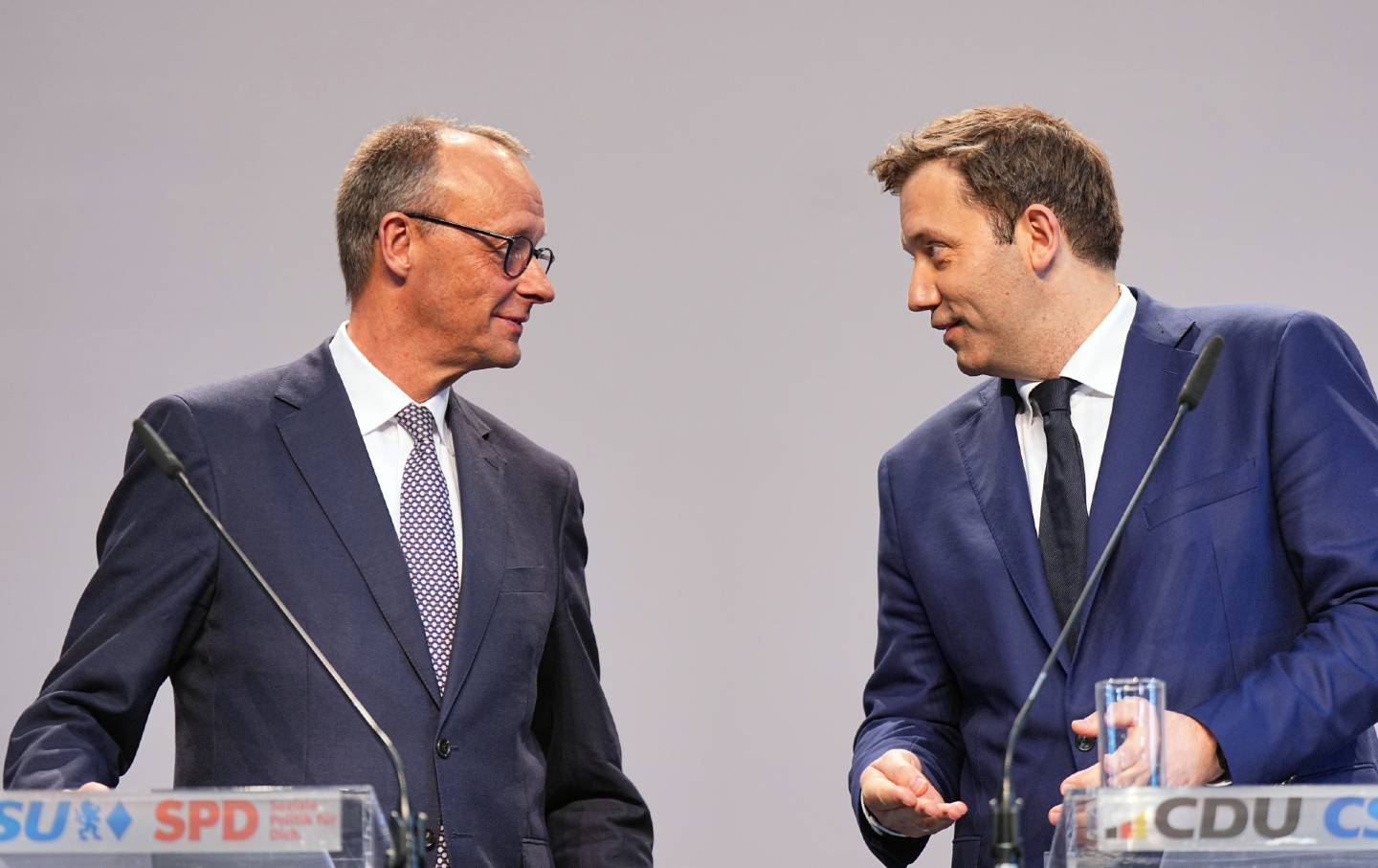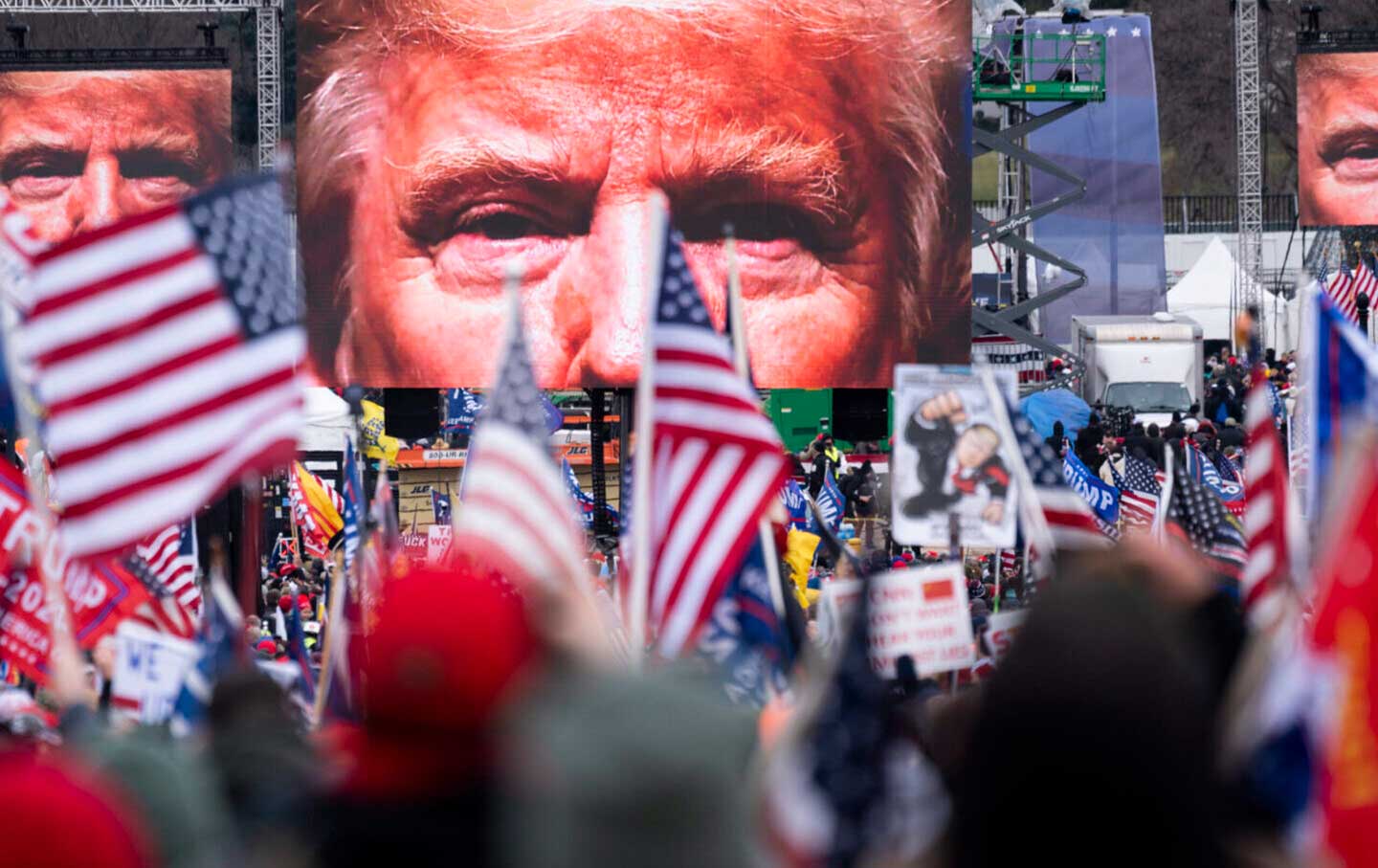Letters From the Apocalypse
Palestinian writers George Abraham and Sarah Aziza were in the middle of an ongoing correspondence. Then came October 7.
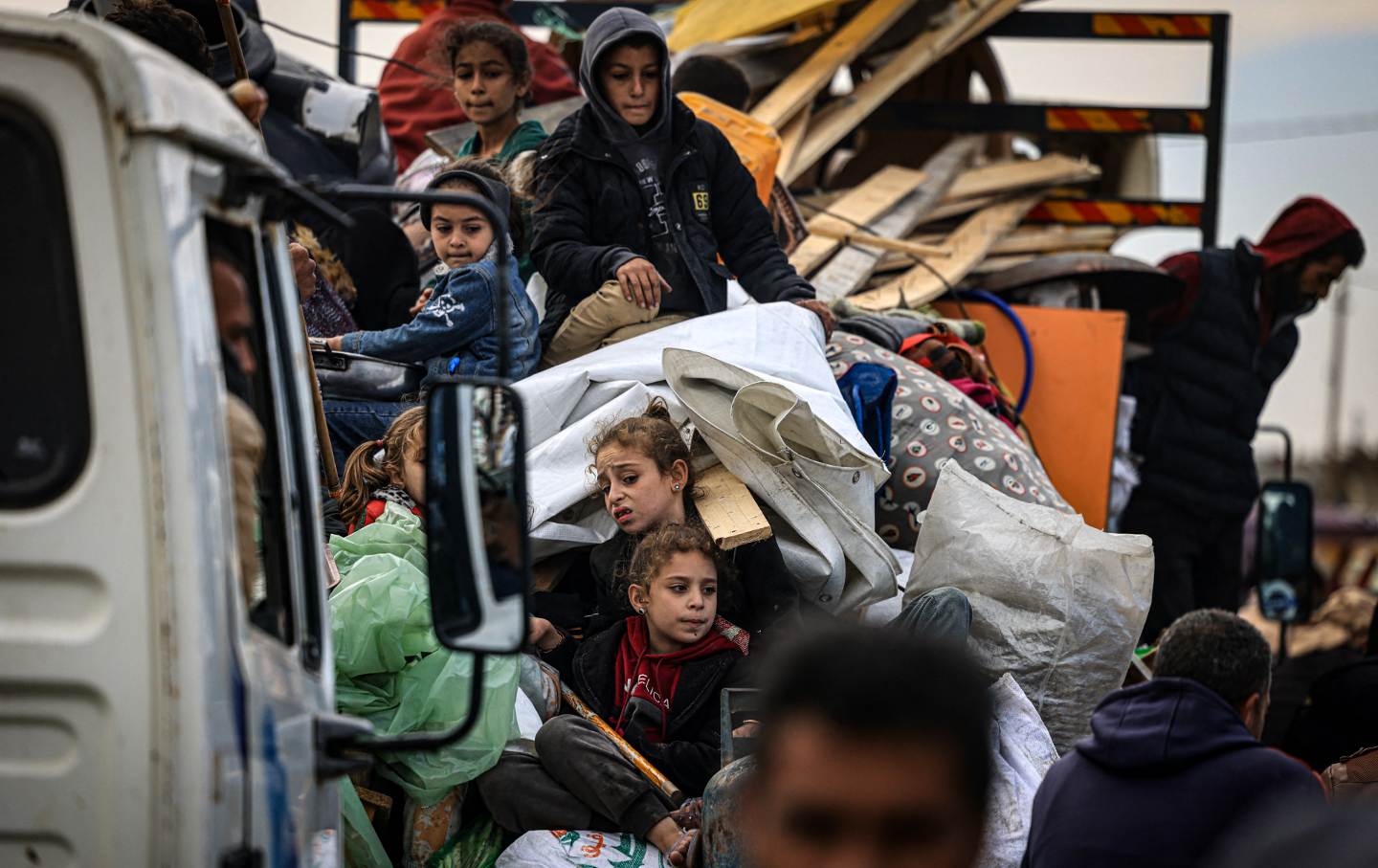
Palestinians flee Khan Yunis in the southern Gaza Strip on January 26, 2024.
(AFP via Getty Images)In September 2023, poet George Abraham and journalist Sarah Aziza began writing letters to each other about their experience as Palestinians, writers, artists, and intellectuals. A month into their correspondence, everything changed.
The authors write:
The events of October 7 added an extremely heightened sense of urgency, anger, understanding, and grief to our exchange. In the ensuing weeks, as the bombing of Gaza continued, the letters became an unintentional record of two Palestinians sharing themselves unreservedly as they witnessed and wrote through mourning—personal and collective—dealing with questions of legibility, resistance, and hope in the shadow of empire.
These six letters, which we call “The Apocalypse Letters,” are a real-time exchange of what it means to write as, and to be, a Palestinian in this world.
September 1, 2023
Dear George,
“Repetition is a Nakba,” you quoted to me the first time we spoke. I think I groaned. The line shivered with the kind of familiarity that makes a body respond. I’ve been preoccupied with repetition lately. Because I’ve been trying to decide whether or not I’m in despair.
One way I’ve heard hope described is “the belief that tomorrow can be different from today.” And todays seem so full of sameness, lately, to me. In the United States, where I live, I look anywhere and see cycles of racialized violence and poverty. I see static hatreds nursed in echo chambers. I see a two-party system that reproduces illusions of choice while recapitulating its death drive. I see dollars perform massacres on the earth, as sunshine re-arrives on what we insist we must destroy.
And then, for us, there is always the seeming sameness of our disaster: the way the Nakba continues, an emergency so ongoing we might mistake it for redundancy, old news. I mean old in the way chronic pain and illness can get old—an agony reborn each minute, but fatigued nerves fire differently. As a sufferer of chronic pain, I am infuriated by the way it dulls the mind, leeches energy and will. In its slow drag, language slackens, imagination bleeds to gray. Even our deepest faiths may falter—like my belief in words. What to say about something so unbearable, and so mundane? Is there language both vast and precise enough to, as Mourid Barghouti said, count the coffee cups at every table? Can we inventory all our murdered windows, all the sky we will not see? And what, after all, can speech do for afflicted flesh?
Popular
“swipe left below to view more authors”Swipe →It has been five months since my last trip to Palestine, and so of course, it has changed. Sometimes I can’t bear to check the headlines—does this make me a bad refugee? I can speak and read Arabic, but I write in English—surely this is a failure too? But shouldn’t we shape our screams in the languages of the empire, and in this, perhaps, make them repent (not repeat) their sins? Yet—haven’t we written them our olive trees over and over again? And have we ever really saved a single tree? You and I chuckled about our private exhaustion with this motif, and wondered aloud how many diaspora Palestinians have actually touched zeytoon. I have, and they are majestic. But I would like our trees to be our trees.
Of course, we also know joy is power. Of course, we make art for ourselves, each other, from our curiosity, exuberance, or care. But how long are we allowed to stay in such states? How swiftly do the feelings of guilt, responsibility, or anger arrive? Do these make our art better? Yes, I believe art is political—but what to do with the pressure I so often feel to persuade? I want my people to live. I don’t want to use my art to beg for our lives.
So I come back to repetition is a Nakba. I think about futurity, and how those of us not consumed with the past can lose ourselves in the swarm of now. With so much dying and denial around, we might spend all day just trying not to disappear. Urgency can seem all-consuming, but chasing the present—which is already leaving us—becomes a form of chasing the past. What this bodes for the future is frightening—repetition, unto death. In the words of Fady Joudah: “Now, dilatory, attritional so that the past / is climate change and not a massacre, / so that the present never ends.”
And so we come to our need for imagination. Our path to what we have not yet achieved must be enacted through things yet unseen. I think of your call for “A lyric-we I dare to call impossible if only to imply that we are always doing the work of (re(dis))becoming.” And I agree that the impossible is where we must go, or else be caught in Joudah’s present that never ends. Our current systems of power will not lead us there. Such a shift must be led by those who have always already been impossible. Impossible to the current order. Impossible, because, as Lorde said, we were never meant to survive. I address you, my fellow impossibility, because I want to know what it might look like—an Impossible we choose.
Did I mention I’m also in recovery? Freeing oneself from an addiction is another sort of impossibility. And here, repetition is salvation. For the first several years, every cell of me screamed Impossible! Still, sometimes—Impossible! But to survive, I must repeat. And maybe, to survive, we must also repeat our attempts at language. After all, Lorde said it is “better to speak,” though the world may still be shaped like our death. You’ve been doing this, in eloquent and powerful ways. So I guess I’m opening this conversation with the question: Do you believe in the future? How does it sound?
Yours,
Sarah Aziza
Popular
“swipe left below to view more authors”Swipe →September 19, 2023
Dearest Sarah,
Thank you for this letter—that line, “Repetition is a Nakba,” from Lena Khalaf Tuffaha’s Kaan and Her Sisters, shifted something in me. Your questions of despair and futurity return me to something Fargo Tbakhi and I have discussed: the implicit illegibility of Palestinians to Western colonial/imperial states. So many shallow understandings of futurity center a politics of legibility, via representation (in media, government, cultural production, etc.). This, while not entirely unimportant, is a trap that can consume us inside out. How might we shift from asking how Palestinians can seek legitimization and representation, to the harder question: How does our mere bodily presence break the entire apparatus of il/legibility within Western neoliberalism?
On the question of my belief in the future, I offer the il/legible image of a black hole. Black holes lie perpetually at the border of the un/knowable, much like the future. Much of our current understanding of black holes comes as speculation on conditions of im/possibility, accompanied by fragmentary observations from tedious and difficult experiments. In this epistemological setting, black holes don’t tell us about themselves as much as they tell us about ourselves via the stories we tell about them; to quote Elias Khoury, “I am a student of Scheherazade—I tell not the story but how the story has been told.”
There are many stories we can tell of black holes, and particularly of the chaos that might ensue if it were possible to touch the singularities at their centers —unimaginable instabilities in the concepts of time and matter. But by the time a black hole’s life cycle is complete, such singular wounds are sutured. In this way, are black holes not guardians of sorts? Bodies un/heard, un/knowing, slowly burning themselves to protect us from un/knowable horrors?
Something about this il/legibility seems helpful in understanding Palestinian life and futurity. We, too, have been the embodied aftermath of im/possible ruptures in space-time. We, too, have collapsed in on im/possible weight, therein, becoming the misunderstood, unlikely caretakers tending to im/possible wounds. Our bodies, too, have been disarticulated by Western ways of knowing, mythologized into unknowable terror in mere existence, fetishized by a hegemony that has always staked its selfish claim in Palestine at the expense of Palestinians.
And so, we become anti-mirrors: In our il/legibility, we tell Western colonial power about themselves, by spaghettifying their stories of us. In us, they do not see us but their inability to see their own selves. Here, we are but one of many harrowing examples of a people hollowed out by colonial, racist, necropolitical regimes of imperial neoliberalism. We build community with the dispossessed, with bodies deemed il/legible by colonial powers, because we know what it means to carry an impossible weight.
But we also have immense potential to harm each other, because we know what it means to be fractured. We can, and must, meet each other at the depths of our terrors, but even that has an event horizon: an unknowable center resisting legibility, knowability, or any kind of identification—a border beyond which nothing can be salvaged. In this way, we can only know each other refractively, in glimpses and fragments. What is love if not a compassionate reckoning with these un/knowables, instead of a failed empathy that claims to be all-knowing in its identification?
By tending to our un/knowable terrors, forming a refractive and compassionate relationality, might we engage in the slow burn process of suturing our primal wounds? In this way, aren’t Palestinians becoming black holes in our living: il/legible guardians who must imagine new forms of memory tending to informational paradoxes that emerge from the conditions of our existence? The idea of Hawking’s radiation is beautiful—how black holes learn to speak in im/possible conditions. What is Palestinian literature if not such an im/possible radiation, a quantum echo from an un/knowable distance?
In the long future, after all the stars implode into black holes, after the black holes consume what remains of stellar dust, the last remnants of the dying universe will be left speaking in this language of Hawking’s radiation: an act that burns remaining mass, slowly, into a void of inevitable silence. The universe keeps speaking, even if it will mean the death of everything. I’d have loved to talk to Etel Adnan about black holes, Allah yerhamha. The Arab Apocalypse is one of the most powerful works connecting the timescales of coloniality and the timescales of the cosmos. I’d love to hear more about the relations that keep you alive at the end of the world.
Gratefully,
G
October 12, 2023
Dear George,
Only a few weeks have passed since we shared a jubilant weekend at Palestine Writes together celebrating Palestinian abundance. How much has changed. I have never felt as imperiled as I do today.
In your beautiful letter, you wrote of collapsing stars, event horizons beyond which we cannot know. I have been thinking about this as this week delivered us into a new history. Like most, my mind was blown when I learned of the breach in Gaza’s walls. I confess my imagination was so limited I had not considered such a coup could come from this battered, besieged place. Yet stunned as I was, I also felt something like déjà vu.
I fear, and expect, that our slow genocide will be replaced by a rapid one. The world has long prepared for our death—they have practiced it every day for years.
Sarah Aziza
You see, a profound depression has held me since this spring, when I returned from Palestine. It was a depression born of the overwhelming conviction that great violence was imminent. The settlements were proceeding at too breakneck a speed, the settler violence rising too fast, the Israeli government growing too unbridled in its genocidal designs. While there, I saw Palestinians still smiling as they could, still exemplifying the beautiful dark magic of our sumud. But something wild, combustible, hung in the air. It felt chemically, mathematically obvious—human beings can only bear so much, so long.
I also spent some time inside 1948/Israel. My skin crawled the entire time—as it often does in the US too, where smooth roads and sterile subdivisions testify to erasure, dominance. My first morning, I stood on a beach in Tel Aviv and shivered at the too-clean sand. Absences, absences—I felt them everywhere. A red haze of violence seemed to halo everything, for I could not forget the ocean of human suffering that swelled just out of sight. I wondered, does the breeze taste clean to them? Do they not smell that stench?
Whenever the next Palestinian uprising came, I knew the Israeli response would be ruthless and unconstrained. I knew Western consensus would clamor to excuse this violence as self-defense, eschewing historicity and blaming us for our deaths. And so, the depression, dread. A sense that our illegibility was our curse. I struggled to think, as you suggest, in the long future of the universe. But I did feel like a black hole, carrying my inscrutable ache inside mundane American moments—like July 4th, when I sat with my back to the wall, weeping over footage of Jenin. Outside, there were fireworks, and the bright explosions felt so cruel.
Back to the déjà vu. On October 7, hearing reports of Israeli slain, my shock mingled with memory. In my writing, I have spent so much time researching and imaginatively reliving the massacres of the Nakba, and those that have happened since. That land has long been stained. This is not to overwrite the suffering of those killed and captured by Hamas. I am fully able to acknowledge it, to tremble at the thought of what it must feel like beneath live fire, to have a loved one hauled away… because such memories already live in my blood.
My relatives were killed by surprise attacks, too. They, too, were unarmed. Did you know the Zionist army debuted the barrel bomb? My aunt was struck by one of the first in history, obliterated in 1948 as she ran with her two small children in her arms. This was in the northern Naqab/Negev. That is, very close to the area raided by Hamas.
I hear it again: Repetition is a Nakba.
I fear, and expect, that our slow genocide will be replaced by a rapid one. Every rhetorical and tactical piece has been arranged for this. The world has long prepared for our death—they have practiced it every day for years. We are the ungrievable, the barbarians, the terrorist “animals.” Our suffering is expected, and excused. Welcomed, even. I fear no number of our dead that will satisfy a regime which has always intended our annihilation, and now anoints itself with the blood of its slain. And I dread watching our slaughter while my grief is rendered illegible by a consensus which has always sentenced us to death.
Per our first two letters: I would love to imagine with you about our potentiality as “embodied aftermaths” who, along with other dispossessed, hum with hidden worlds, languages yet unknown. I want to talk about relationality, of the call for radical compassion in new forms we will invent. But today, futurity vibrates on the level of the instant. In the question of whether my Gazan family, whom we are unable to reach, still breathe.
What I’m saying is, we Palestinians are bracing, trying to make it from one inhale to the next. This is a moment for the rest of the world to decide—will they stand aside, or even alongside, the calls for genocide? Or will they move to break the death cycle planted in colonization, to wake up from this nightmare of repetition, to admit that, if force could forestall resistance, it would have already vanquished us? They don’t even have to be merciful. They just have to see. We are illegible, yes, but not invisible—yet.
Yours,
Sarah
October 30, 2023
Dearest Sarah,
Oh, how your letter has weighed on me. We began writing to each other months ago, not knowing this was where we’d be. I think we are always writing from the inside of Palestinian catastrophe, to some extent, but I confess that, like you, this all has taken me by surprise for similar reasons. I consider it a failure of my own imagination, too.
I cannot stop thinking about that Twitter video of an ordinary man from Gaza escaping his open-air prison, praising God while returning to his land that he hadn’t been able to see or touch for decades. I think about the many griefs of that act too: how, even in impossible conditions of colonial blockade, our people find ways to resist—how, in a single moment, this brief return carried over 75 years of ancestral yearning on its back—how, as I witnessed this act from screens and distances, I couldn’t help but preemptively fear for his (and everyone’s) life. Again, repetition is a nakba. We’ve been here before. On the 7th of October, I remember staring into the black hole of revolution, witnessing this event horizon of a man, compounded between past-present-future griefs simultaneously.
In the days that followed, I had to continuously reckon with this dissolution of the inside/outside boundary for Palestinian catastrophe. Every day has felt like a different kind of trauma response: fight of institutional erasure, flight from those incapable of joining our fight—fight of accomplice, flight from ally—fight of animals, flight from their idea of Human. And then the freeze, the numb, the distance.
My paradox is one of presents and presence. I’ve been trying to escape the insistent present tense of empire: reactions to genocidal misinformation and Zionist propaganda that seek to distract us, swallow our time, and consume our life force. These are traps insistent on the total annihilation of the Palestinian people. But at the same time, there is another gravity forcing me into a different present: the need to center increasingly urgent Gazan demands for a cease-fire in every space I enter, fueled by a need to remain as present as possible for my people so that I may (to borrow Leanne Betasamosake Simpson’s term) actively presence them, even in spectral weight, beyond life-death boundaries, in my daily living.
“What is the opposite of erasure?” Hala Alyan asked us at Mizna+RAWIFest last weekend. She claimed that witness is the opposite of erasure, saying that art makes witnesses of us all. I agree, big-picture, but struggle with the minutiae here. What does witnessing do, exactly, from the inside of a system set on annihilation? Edward Said argued in “Permission to Narrate,” that for Palestine, facts do not speak for themselves but need social forms to circulate and become narrative (which always boils down to power). Following this, I wonder about the usefulness of witness without such systems of circulation? This gets me to think structurally, and art’s potential to encourage thinking and action beyond mere witness. While art makes witnesses of us all, how might it also redirect that witnessing away from the positional, reactionary, & performative, and towards responsible, insurgent, & structurally oriented resistance?
How have you been able to keep writing, amidst all of this? I’ve been struggling to focus on my (very Palestinian, grief-driven) memoir. Every time I return to the page, I feel frozen, as if I am being sucked into an inescapable present. What can matter more than this now, than Gaza, than our collective? I know, in the eventual course of things, my writing is always intended to be a gift to our collective, to/from/despite impossible times we’ll have ahead of us. But how can I make (especially narrative) art when Palestinians are being materially genocided, and discursively dis-articulated at an onto-epistemic level?
I’ve been thinking about the interruption of grief. This grief we’ve been surviving has disrupted our daily modes of living, and so it only makes sense that it will disrupt my art. I know this, and yet, there is a restlessness I cannot escape. For the past several years, the sudden death of my father has totally disrupted and shattered my poetry writing process. I’ve let that disruption happen, following the grief like a tunnel through which I didn’t know I was traveling. Like my fatherly grief, I am trying to let this repetition of Nakba break my heart, wholly—to trust in the processing of grief as I trust in the becoming of Palestinians. I am trying to be as present as possible with this grief work, so that it may sharpen my daily actions and commitments.
And yet —frozen in an inescapable present—I write this instead.
G
November 11, 2023
Habibi George,
How I wish we had nothing more to say to each other about destruction. How I wish the repetition would end, empty into a finally-new moment: a day of holy quiet skies, our torn land left, at last, to breathe.
Instead, in the time since I last wrote you, we have seen the official death count—which many believe is an underestimation—multiply almost tenfold. As I compose this letter, they name over 11,000 slain. For the last month, our souls have been battered, mangled by the shrapnel of our livestreamed genocide. I am forced to knock out the walls of my imagination again and again, to make way for ever-deeper depravity. I discover what a body looks like when it is both bloodless and crushed. I learn how long a premature baby can survive without warmth. I now know what it sounds like when a 4-year-old orphan describes war. I hear my father sob as I never have before.
Throughout, I have felt almost criminal for my physical safety, even as I am assaulted on every other plane. As you say, we have been reminded, in the strongest terms yet, how it feels to be erased. Each day, around the world, we are obliterated with both silence and speech. We have watched governments, companies, and campuses scramble to outdo one another in vilifying our existence, abandoning all rationality in their determination to marginalize and smear. It’s staggering to be valued so little while mattering so much.
I have caught myself muttering, I can’t believe I’m Palestinian…—which is just my clumsy way of saying that I don’t know how to grasp the way our mere existence is a question that has set the world on fire. Even after a lifetime of being treated as rhetorical, I am still shocked by our cruel peculiarity. I have spent my fair share of years trying to earn my humanity, contorting and performing, conceding and caveating, hoping the right combination of words and self-subtractions might render me admissible in the courts of colonial power. Perhaps, I once thought, if I can earn their empathy, they will admit our right to, if not liberation, then at least to life.
Thank God, I have long since given up that fight. There are those who can see, as you did, the man running through that torn fence, and know what his legs truly raced toward, and from. The rest will call him only terrorist and insist on his death. They will not grasp that theirs is a world that requires this man, on any side of the fence, to be always-already both terrorist and dead. My view, now: It is not my work to engage in the oppressor’s worst thoughts about me. As a Palestinian, I have tried to remain in conversation with life.
Of course, this feels near-impossible lately. You described the dissolution of the inside/outside of catastrophe, and my flesh says this is true. My body, always the first to register spiritual distress, has been quite literally falling apart. Some days, overwhelmed by our death—at least 26 in my family, Allah yarhamhum—I have folded, catatonic, on the floor. Yet I have also turned back from collapse, again and again. Turned to those iconic, and tragically abundant, clips of our people scrambling to rescue bodies from debris. Watching their dust-choked bodies move, their limbs thinner by the day, I fill with wonder and bewilderment. How, I wonder—as in, how do they still have the strength? And—more provocatively–why?
Why have we not succumbed? What is the life these bodies are hauled back into? What is the world they will receive? After years of grinding, atrophic misery, why do they—we—cling to life? I have decided my answer is love. It is a word that, if I am lucky, I will spend this lifetime trying to understand.
But what I can say is love defies the construction of simple present/past. Perhaps it is that spectral weight you speak of, which knows no end in death. Perhaps what holds us is something beyond the event horizon, a gravity of things unseen. Here, I think, we come to your question of how we, and our art, might go beyond the mere act of witnessing—because as potent as witness may be, I struggle to see it as a position of power. I want to be, as you say, responsibly insurgent. I too want structural change.
And this touches on something I’ve been pondering: the condition of our species. When, on October 7, I began expecting this genocide, it was in large part because of how we’ve been utterly dehumanized. We’ve all heard the terms used by Israeli and American officials to describe us–animals, savages, etc. We rightly fear what violence can befall a population rendered in such inhuman terms. And yet.
What is it, exactly, that we mean by human, I wonder? Under this name, we have a long history of bloodshed and tyranny. Lately, the issue of climate change alone has had me uncertain of whether homo sapiens will, or should, survive. If we cannot respect the clear language of nature, do we deserve a future there? This is not to discount the utter preciousness of individuals. I (mostly) want to live my own life, long and full, if I can. And I honor and affirm my neighbor’s desire for the same. Yet, yet, what is this thing we call Humanity? It is the word we appeal to when asking for mercy. And yet it is a category from which so many have been functionally excluded.
Now, when the so-called civilized world is again roundly and proudly supporting mass death, it becomes ever clearer to me that their “Humanity” is not mine. And I am not alone in this reflection—in the past week, I have heard Fred Moten harp on similar ideas and listened to a poem our friend Ghinwa Jawhari wrote to this effect. Something at the core of our human-built world is failing not only Palestine, but everyone.
I have always hoped a liberated Palestine would be a place where we might experiment with life beyond the nation-state. Having been denied active participation in this historical epoch, I saw us poised to be leaders in moving Humanity beyond it. But now, I ponder a more radical reinvention. What to us is this Humanity we have pledged ourselves to? What might we create instead?
So, to finally come to the question of our writing and the interruptions of grief—I have been struggling to finish my book, too. I have had no choice but to follow my body for hours away from the screen. I have let my face leak onto the floor. I have exhaled shallow breaths, wishing I could send them to those gasping under falling skies. But perhaps it is only right that our grip on narrative is faltering. Maybe we are midwifing something radically new. Perhaps, just as art wounds theory, our existence, and our struggle to exist, is wounding the very premises on which our current world is built. Perhaps we can and must allow ourselves to be guided differently. Pulled by the spectral weight of our love, even if it means running through walls.
Yours,
Sarah
November 29, 2023
Dearest Sarah,
Your letter touches directly on many conversations I’ve had with Palestinians: friends who’ve also accepted that we’ve long since abandoned our quest to beg for empathy—friends who also measure time in the amount of our slaughtered kin, in the backdrop of yet another “cease-fire” that is not really a cease-fire.
I’m so glad you mentioned Moten, and am so grateful to have this space of processing. So many threads of Black radical thought have been reckoning with how the Western neoliberal notion of Human (and modernity’s entire world order) has been built, structurally, on the annihilation of all potential relations to socially dead Black subjects. There’s a contradiction here that’s generative: if we as Palestinians default to neoliberalism, wouldn’t our nation-state simply continue buying into this failed idea of Human? What, if anything, is even salvageable from such notions? I’m wary of comparing what Palestinians are going through to social death, as that idea implicitly resists analogy. However, we’re experiencing our own different dehumanization process, for which Black/Indigenous thinkers have given us useful analytic tools. We’re at the event horizon and must choose: falling for neoliberal Humanity, or doing the tougher work of building an un/knowable world beyond it?
I think about folks like you and Fady Joudah who’ve had family directly martyred by the Zionist state, Allah yerhamhom. I had a brief text exchange with him and found myself not knowing what to say besides: I cannot imagine what you’re going through. He, generously, reminded me of how we are united in this grief: how every single killed Palestinian is a grief we all collectively share and feel—how there isn’t a hierarchy to grief, and in fact, we are one in mourning—how the heavy, supersaturated, necrotic landscape has cut through vectors like blood relations, and has the potential to wholly reconfigure our notion of kin, collective, and care, if we allow ourselves to grieve wholly.
It is time, as you so aptly remind us, to show our love for Palestinians…. there is now, and now is a miracle, for it is the time of love. I know no future besides love.
George Abraham
I had another death in the family recently: my great uncle Nabil, Allah yerhamo, who was a poet back in Ramallah. He was always first to like my poems on Facebook. At a formative age, he told me that real poetry should terrify politicians, especially Americans, with truths they cannot bear. He was always the first to center Palestinians in our family conversations. I hate that this was the world he had to pass away in, witnessing a genocide in Gaza, in exile. The day I got the news of his death, I spent hours crying over him, remembering him as I scrolled through the small archive of his Facebook. There, I found this untitled poem, the last he ever posted, from last year. It begins:
ليس للصباح جمال
والشعب محروم من الحرية
والكرامة والعيشة العارية
التي تتمتع فيها بقية الناس
Every stanza moves like this, with an opening refrain I can only fail to translate as “not, to the morning, beauty,” before continuing to list all of the things he cannot give to the morning, in grief for Palestinians. Through a winding syntax I can only know in Arabic, the sentence’s subject, or lyric I, never arrives. Here, his poem’s sentence structures embody, at once, an absenced self in grief, and a construction of self in the non– of every mundane thing Palestinians cannot have right now. My Amo teaches me, beyond the grave, how to mourn, completely, in his breathless Arabic.
Here, I am reminded of conversations I’ve had with my thesis committee, who have been my rock amidst all of this, reminding me that sometimes trauma pierces through narrative and can only be understood through the un/sayable lyric, where language might do the work of im/possible holding regardless of genre or form. I’ve been grateful for these small havens in an institution as vile and cowardly as Northwestern right now—an institution moneyed, as many Chicago schools are, by weapons companies like General Dynamics who profit off of Palestinian genocide. There is no future, no redemption, for institutions like this that are structurally entangled with this colonial death machine. The future academy will need to work beyond neoliberalized diversity and inclusion, beyond the failed project of the Human. I have never felt as ready for this structural work as I do now. It is time for us, as intellectuals, to grow a collective backbone, to become accomplices who distribute risk instead of allies who perform.
It is time, as you so aptly remind us, to show our love for Palestinians, in our words and actions, in every de/re-construction. I know you chose that word, love, so intentionally, thinking back to our conversations on Etel Adnan’s writings on the “supreme violence” of love. She who loved Palestinians in the most impossible times—who witnessed the dissolution of the inside/outside of our catastrophe in the Lebanese Civil War, and therein, gave us language so devastatingly relevant today through works like The Arab Apocalypse. I have never felt so close to this text. Trapped between the hyper-formal time structures of war, and the unimaginably vast formlessness of our collectives—just as she is trapped between a past we vowed never to repeat and a future we’re incapable of imagining—she gives us an apocalyptic liminality: a reminder that there is now, and now is a miracle, for it is the time of love.
I know no future besides love, despite the im/possibilities and violences it may require of us, and therefore I trust no future besides work & wormhole. I write this on an airplane, knowing the best writing happens when I am in liminal spaces. I am rereading your words and witnessing the past-future collapse of everything, and it is beautiful, for it is love. Winter has arrived, already. And it is time—my friend, it is beyond time—for the fall.
In rage, in wit(h)ness, in love—
G
Hold the powerful to account by supporting The Nation
The chaos and cruelty of the Trump administration reaches new lows each week.
Trump’s catastrophic “Liberation Day” has wreaked havoc on the world economy and set up yet another constitutional crisis at home. Plainclothes officers continue to abduct university students off the streets. So-called “enemy aliens” are flown abroad to a mega prison against the orders of the courts. And Signalgate promises to be the first of many incompetence scandals that expose the brutal violence at the core of the American empire.
At a time when elite universities, powerful law firms, and influential media outlets are capitulating to Trump’s intimidation, The Nation is more determined than ever before to hold the powerful to account.
In just the last month, we’ve published reporting on how Trump outsources his mass deportation agenda to other countries, exposed the administration’s appeal to obscure laws to carry out its repressive agenda, and amplified the voices of brave student activists targeted by universities.
We also continue to tell the stories of those who fight back against Trump and Musk, whether on the streets in growing protest movements, in town halls across the country, or in critical state elections—like Wisconsin’s recent state Supreme Court race—that provide a model for resisting Trumpism and prove that Musk can’t buy our democracy.
This is the journalism that matters in 2025. But we can’t do this without you. As a reader-supported publication, we rely on the support of generous donors. Please, help make our essential independent journalism possible with a donation today.
In solidarity,
The Editors
The Nation

